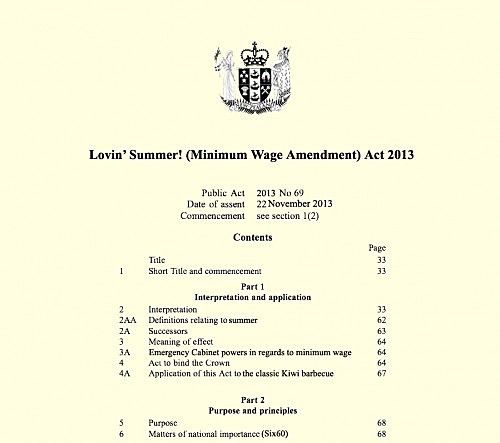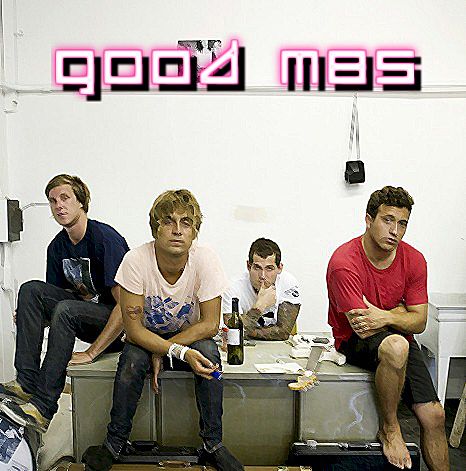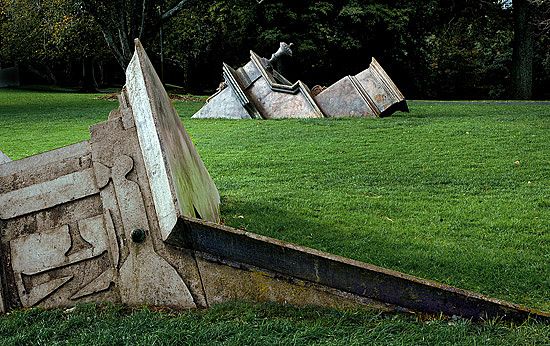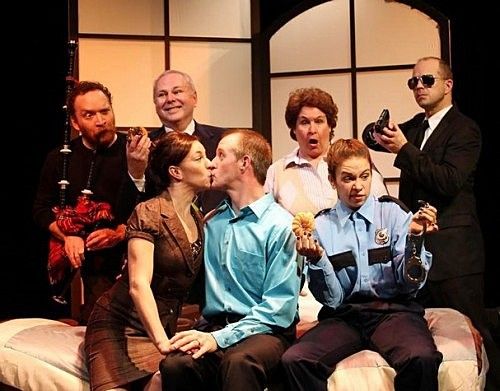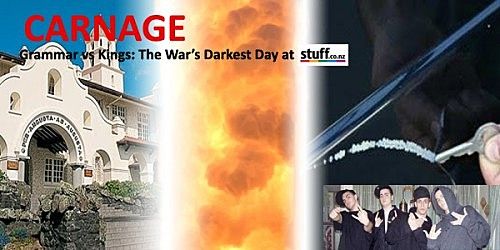A Punch Foretold: Five Predictions For The Year Ahead
The site returns for 2013 in seer-like anticipation of the events that will rock NZ arts, culture and society in the coming year.
Year-end roundups are an exhausting job. Seriously. If you think you can get to December and write about everything that happened without going to bed with a damp cloth on your face, good luck. And fetch me a damp cloth. With that in mind, I've been asked by the site's subterranean masters to try and sidestep the whole thing with a quick precis of what's statistically certain to transpire in the next eleven months. Meanwhile, our Internet Histories column resumes on February 4, with a slew of exciting things to follow from there.
1. The National government resuscitates flagging fortunes with “Lovin' Summer” bill.
Though the statesmanlike CEO-style executive power-up leadership of Prime Minister John Key continues to be hailed by as many as three Weekend Herald columnists on any given Saturday, 2013 mirrors the same economic and administrative malaise that beset the National government in 2012. There is a steady stream of privacy breaches and minor yet unflattering conflicts of interest; the “NZ film industry” fails to produce the anticipated number of jobs and unemployment stays steady; house prices remain intractably high to the point that National's core vote begins to dip.
Subsequently, Key announces in his capacity as Minister of Tourism that the government will pass emergency legislation recognising summer as the official season of New Zealand, providing subsidies to major recreational events between the dates of December 1st and February 27th, and allowing Cabinet to suspend the minimum wage indefinitely under a fast-track procedure where economic circumstances make it prudent to do so.
“New Zealand is the first country in the Southern Hemisphere to greet the summer each year, and I think it's fair to say that summer is one of our most valuable tourism exports,” he tells the press. “Kiwis love the beach, the barbecue, and their favourite band playing live or on the iPod, so let's make that official and be proud going forward!” Key concedes there are other administrative “loose ends” the bill tidies up, but asserts that the real focus is on a “100% pure cracker for New Zealand these holidays, set to really get rowdy and communicate the brand to the world”.
David Shearer's Labour is torn on the Lovin' Summer! (Minimum Wage Amendment) Bill – unions urge the Opposition to read the legislation in detail and demand removal of the minimum wage clause in the truncated Select Committee process, but after extensive focus-grouping Labour's top advisors determine that Kiwis just really love summer. Under pressure from Key and Steven Joyce, both continually referring to Shearer as “Old Man Winter”, Labour indicates it will provisionally support the bill in its entirety but retain a policy to review it if and when they gain power.
The Lovin' Summer! Bill's overwhelming passage in the House is marked by National's highest polling since 2008 and three simultaneous Feelers gigs across the upper North Island. All go off.
2. Protect Marriage NZ starts label, launches world's first 'homophobic indie' band
Heading into 2013, Protect Marriage NZ reads the tea leaves and realises its campaign to overcome marriage equality has failed to seize the imagination of a young and university-educated demographic. In an attempt to tap into the zeitgeist, the organisation assembles a handpicked four-piece of strapping young men from the four megachurch corners of Auckland and forms what is believed to be the first indie band expressly designed to counter gay marriage.
Good M8S describe themselves in their bio as “combining the homespun intimacy of Fleet Foxes, the exuberant tribal electronic energy of Yeasayer, and the moral righteousness of Pastor Billy Graham”, and indeed, debut single “Just Good Mates” sets out to achieve that sublime sonic balance. Marriage equality campaigners are vocally appalled; meanwhile, most NZ media outlets undertake their typical level of background reading on the band and award the debut EP four stars. Quoth the Dom Post: “we might just have another Phoenix Foundation on our hands!”
Good M8S ultimately fail to live up to sales and airplay expectations, although when their Soundcloud is quietly taken down in September a surprisingly large handful of Wellingtonians take to Facebook and beg them not to “apologize for their art”. Meanwhile, a post-mortem survey reveals that over 86% of the intended target audience disliked the band because they were 'fake', and were not aware of any official steps to legalise gay marriage.
3. John Ansell finds evidence of pre-Maori Celtic warrior race in Ponsonby
Outspoken ad man John Ansell announces in March that his Colourblind State campaign to spur a citizens-initiated referendum to scrap the Treaty of Waitangi will resume with a vengeance. The revival follows a 'bombshell' discovery in the heart of Central Auckland which he guarantees will expose the 'corrupt foundations of New Zealand-Maori relations'. At a press conference at Ponsonby's Western Park, Ansell points proudly to the surrounding architectural dismemberments of John Radford's sculptural installation 'TIP'.
“Never mind the so-called 'pa' and and kumara pits. These previously-undiscovered ruins show the mastery of European design and a tenacious sophistication that was not only beyond Maori but preceded them by centuries.” Ansell estimates that TIP's Celtic creators travelled through seasonal flooding from Europe into the Red Sea and thus to Australasia in the 8th century AD.
Aucklander reactions are marked with a jaded urban scepticism, with many pointing out that Palmerston North-born Radford created TIP in 1998 and that its construction can be readily Googled. In the provinces however, word spreads of a DOC coverup of mammoth proportions aided and abetted by smug latte-drinking academics. Ansell is briefly feted, while “True New Zealand” tours are conducted of Radford's public works (including proof that fixed windows of 19th century European design existed in NZ for at least a millennium) . But the news cycle moves on all too quickly – by year's end, the real Western Park scandal is not Ansell, but the revelation that over half of the second Hobbit film's action sequences have been filmed in front of the sunken buildings, tightly framed to conceal Art In The Dark setup, the d-Vice store and both Ridges. Sir Peter Jackson is candid but unapologetic, stating: “I can't be on all the time.”
4. ATC goes 100% farce.
2013 marks the year the Auckland Theatre Company makes an economic decision to abandon dramatic productions entirely in favour of lighter fare in the vein of The Motor Camp, A Shortcut to Happiness, and In The Other Room. The season is replete with canny observations about middle-age and class (in A Home Away From Holiday, a comfortable and well-to-do lawyer in his 50s tries to bridge the gap with a comfortable and well-to-do plumber in his 50s), the generation gap (in A Man's Home Is Her Castle, much humour is had of a spoilt teenage daughter's 'smartphone'), sexual misunderstandings, and gentle merriment at the expense of the disabled and overweight. At least four of the plays feature aging women with no narrative drive beyond their desperation to find a younger man. In at least five of these plays, the younger man is played by Pua Magasiva, shirtless. Always shirtless.
Not to deter the participation of a rising new clutch of playwrights, Eli Kent receives a commission to follow up his acclaimed and edgy Black Confetti. The final workshopped play, The Vicar's Whoopsie, blends Kent's trademark fever-dream intensity with a bucolic and gently observed comedy of rural manners, as a drifting and alienated young protagonist finds out 'mucking in' on the farm is harder work than it seems with a lascivious priest's daughter about.
5. Stuff Nation comes of age documenting Grammar vs Kings war
Fairfax's ersatz citizen journalism effort Stuff Nation experiences a baptism of fire following the publication of a uncensored and sanguine account of a conflict that mainstream media had steadfastly and willfully avoided. Michael Carlson-Davies, a Year 11 student at Auckland Boys Grammar School, describes his involvement as thus:
Kings are a pack of cuns you gay little wankers think everything in ur school is so perfect. Stop being jealous cos we the best at rugby cunts GRAMMAR allldaaay ill fck you up! Well key your Merc again if we see it in Mountain rd EPSOM THUGS LOCCKDOWN bitch! If Kevin from kings Year 10 so keen on Michelle Greenberg can come ova here keen for da one on onez.Ur wasting ur life at a shit school touching guys and mak not mistake this is WAR...GRAMMAR PRIDE
At every level, including its governance and principal, King's College is swift to demand its right of reply from Stuff. In short order, a riposte clarifies that Carlson-Davies drives a “fucken old subaru” (2003) that any keying would be considered an act of elevation, and that Michelle Greenberg is a “salpper” and that no King's boy would go near her.
With new correspondence from participants and grumpy neighbours arriving by the hour, Stuff experiences an unprecedented daily hitrate. The National, World and Business news sections are eventually retired for an RSS feed of constant updates of the Kings-Grammar war. A regular auto-refreshing map of the Remuera area indicates where flaming excrement has been left on doorsteps and letterboxes have been tagged with dicks, sometimes only five minutes after the event.
By July, Metro has recalled award-winning journalist Jon Stephenson from Afghanistan to cover the conflict back home. His diligent, patient and humane coverage never snitches to the parents by giving full names, gets Michelle's side of the story (she only kissed Carlson-Davies on a dare and it was totally gross) and troublingly, suggests that the tee-peeing of the King's Chapel was an inside job. In time, Stephenson's decision to gain the trust of his sources with 12-packs of Cody's becomes one of the foundational case studies in media ethics for AUT communications students. All the while, the secret and undereported Dio vs Cuths 'dirty war' claims over 6000 lives, many of which are civilian.

